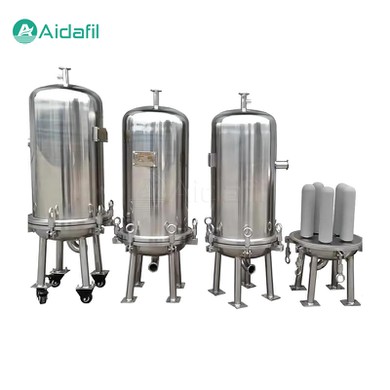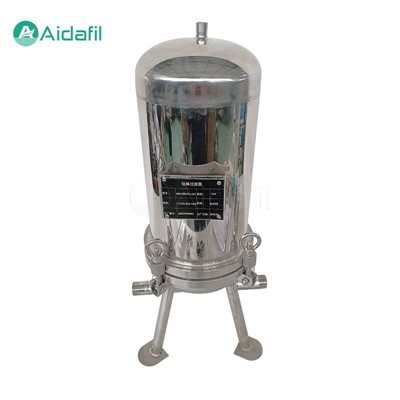
Good Mechanical Strength Titanium Rod Filter
The good mechanical strength titanium rod filter, a kind of high-efficiency filtration equipment made of titanium powder sintered filter cartridge, is widely used in medicine, food, beverage, chemical industries. Its excellent high temperature resistance and corrosion resistance enable it to work stably in harsh environments such as high pressure, strong acid, and strong alkali.

The good mechanical strength titanium rod filter is a kind of high-efficiency filtration equipment made of titanium powder sintered filter cartridge, which is widely used in medicine, food and beverage, chemical industry and other industries. Titanium rod filter uses titanium metal powder to be processed into hollow filter tube by high temperature sintering method, which has the advantages of high precision, high temperature resistance, corrosion resistance and high mechanical strength.
The good mechanical strength titanium rod filter uses a titanium powder sintered filter cartridge as the core filter element. This filter cartridge is formed by sintering titanium metal powder at high temperature to form a hollow filter tube with a microporous structure. The titanium material itself has good biocompatibility, corrosion resistance and mechanical strength, which makes the titanium rod filter an ideal choice for many high-demand filtration occasions. The housing of the filter is usually made of 316L or 304 stainless steel to ensure the durability and safety of the equipment.
Parameters
|
Main materials |
Stainless Steel 304, 316L |
|
Filtering flow |
3 - 100 t/h |
|
Working pressure |
0.1 - 0.6Mpa |
|
Filter element specification |
5'', 10'', 20'', 30'', 40'' |
|
Use temperature |
-10 - 200°C |
|
Filtering accuracy |
0.45 - 100μm |
|
Filter element connection |
M20, M30, 222, 226 |
|
Titanium rod size |
Φ60×300, Φ60×510, Φ60×750, Φ60×1000 |
Structural features
1. Filter element structure
- Microporous structure. The titanium rod filter element has a uniform microporous structure, which can provide high-precision filtration effect and effectively intercept particles above 0.45 microns.
- High porosity. The microporous structure formed during sintering is not only uniform but also has a high porosity, which helps to reduce filtration resistance and improve permeability.
- High pressure resistant design. The titanium rod filter element can withstand high working pressure and is suitable for use in high pressure environments.
2. Housing design
- Material selection. Choose high-quality stainless steel materials, such as 316L or 304, to resist corrosion from various chemical media.
- Sealing performance. Good sealing performance ensures that there will be no leakage during use, ensuring the safety of operators.
- Easy maintenance structure. The design takes into account the need for easy disassembly and replacement of filter elements, making maintenance work simple and fast.
Filtration performance
The filtration performance of good mechanical strength titanium rod filters is one of its greatest advantages, enabling high-precision filtration without sacrificing flow. This is especially important for applications that require a large amount of filtration without affecting productivity.
1. High-precision filtration
- Strong interception ability. Can effectively remove tiny particles in the fluid, including bacteria, microorganisms, etc.
- Consistent performance. The homogeneous microporous structure of the sintered filter element ensures the consistency of the filtration effect.
2. High permeability
- Low resistance. Compared to other filter materials, the titanium rod filter element provides less resistance, which helps to improve the overall filtration speed.
- High throughput. Even in the case of high-precision filtration, it can maintain a high flow rate to meet the needs of large-scale production.
Corrosion resistance and high temperature resistance
Another outstanding feature of the good mechanical strength titanium rod filter is its excellent corrosion resistance and high temperature resistance, which allows it to operate stably in a variety of extreme environments.
1. Chemical resistance
- Wide chemical compatibility. Titanium materials have good resistance to most chemicals, including strong acids, alkalis, etc.
- No metal dissolution. No metal dissolution occurs during the filtration process, ensuring the purity of the filter medium.
2. High temperature resistance
- Good heat resistance. Titanium materials can maintain stable performance in high temperature environments without damage due to temperature changes.
- Small coefficient of thermal expansion. Titanium has a small coefficient of thermal expansion, which means that the size and performance of the filter element do not change much when the temperature changes, helping to maintain long-term stability.
Scope of application
The good mechanical strength titanium rod filters are widely used in many industries due to their excellent performance, especially in applications where filtration accuracy and corrosion resistance are strictly required.
1. Pharmaceutical industry
- Large infusion and injection production line. Used for decarbonization filtration to ensure drug safety.
Biological products. During the production of biological products, they are used to remove insoluble impurities and microorganisms.
2. Food and beverage industry
- Drinking water treatment. Provides safe drinking water filtration solutions.
- Beverage production. During the beverage production process, it is used to ensure the clarity and safety of the product.
3. Chemical industry
- Chemical filtration. In the chemical production process, it is used to remove solid particles and insolubles.
Solvent recovery. During the solvent recovery process, it is used to remove impurities and improve the quality of recovery.
Maintenance and regeneration
In order to ensure the long-term stable operation of titanium rod filters, regular maintenance and correct regeneration methods are essential.
1. Cleaning method
- Backwash. Remove impurities from the filter element through reverse flow of cleaning liquid.
- Chemical cleaning. Use specific chemical reagents to dissolve and remove stubborn dirt from the filter element.
2. Regeneration treatment
- Heat treatment. For certain types of contaminants, the performance of the filter element can be restored by heat treatment.
- Mechanical cleaning. For some cases of physical blockage, mechanical cleaning methods can be used to remove impurities.
FAQ
1. Q: What is the function of a filter?
A: The main function of a filter is to remove solid particles, impurities, and harmful substances from liquids or gases, in order to achieve purification, clarification, and protection of equipment.
2. Q: How to choose a suitable filter?
A: When choosing a filter, factors such as the properties of the material being filtered (e.g., viscosity, temperature, corrosion), required filtration accuracy, processing capacity, operating pressure and medium, as well as the type, material, size, and installation method of the filter should be considered.
3. Q: What is the working principle of a filter?
A: The working principle of a filter mainly relies on physical screening, deep interception, absorption, or chemical reactions to remove impurities or harmful components from the material being filtered.
4. Q: How to maintain and care for a filter?
A: Maintenance of filters includes regular cleaning or replacement of filter elements, inspection of seals and fasteners, maintaining stable operating pressure, and avoiding overloading. Specific methods should be referenced from the filter's instruction manual and maintenance guides.
5. Q: What is the service life of a filter?
A: The service life of a filter depends on its working environment, processing volume, and filtration accuracy. Generally, when the filter's pressure drop reaches a certain value or the filtration effect decreases significantly, it needs to be replaced or cleaned.
6. Q: What should be paid attention to during filter installation?
A: During filter installation, attention should be paid to the directionality, ensuring that the fluid enters and exits from the correct ports. Also, the piping system should be cleaned before installation, and the filter should be securely fastened and sealed as required by the instructions.
7. Q: What is the replacement cycle for filters?
A: The replacement cycle for filters depends on their working conditions and filtration requirements, and is usually indicated by pressure difference indicators or timers. When the filter's pressure drop reaches the set value or the filtration effect decreases, it should be replaced in a timely manner.
Why Choose Us
· Professional manufacturer with many years' experience
· Good quality with competitive price
· OEM & ODM are welcome
· Various payment items are acceptable
· Good service by experienced manager
AIDA Philosophy
1. Management Concept:
· Satisfy the customers' demand --- Touch customers, trust with our products and services
· Make employees happy --- Pursue higher material and spiritual happiness
2. Company Mission:
· Focus on customer needs, provide best filtering solution
· To be the lifelong partner with customers
3. Corporate Vision:
· Become a global purification leadership brand
4. Values:
· Customer: Pursue the ultimate experience, enjoy excellent quality
· Team: Trust, responsibility, growth, win-win
· Work: Simple, sincere, efficient, dedicated
Hot Tags: good mechanical strength titanium rod filter, China, factory, price, buy, good filtrating oil separator air, Air Compressor Oil Filter, air oil separator for contaminated condensate, cartridge compressed air coalescing filter, compact stainless steel duplex strainer, high porosity sintered metal fiber felt







